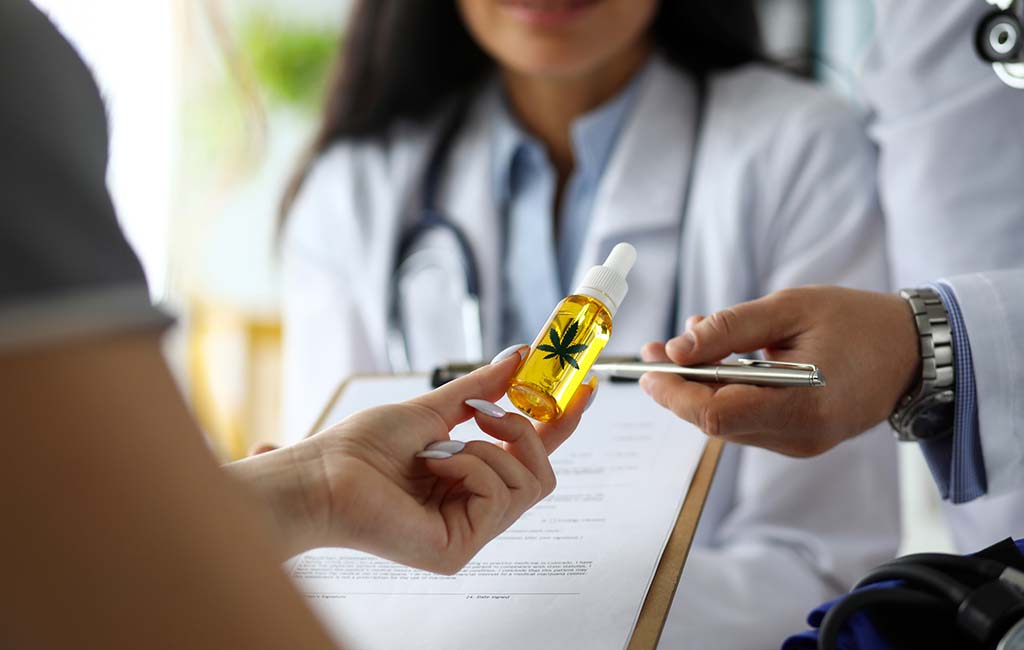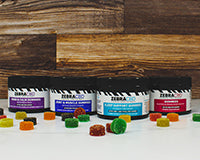
Chances are you’ve heard the buzz surrounding CBD. You might walk down your favorite block and see CBD lattés at the coffee shop, CBD facials at the spa and CBD mints and candies in the checkout aisle at your go-to market. If you’re hip to health trends, you might have seen other plant-based products come and go; remember acai and maca?
There’s good evidence, though, that CBD is here to stay. There are many possible CBD oil uses, including stress relief and lowering inflammation levels in the body.
The benefits of CBD are numerous, from helping with ... general inflammation ... to sleep support, heart health support and easing muscle strain.
This helpful primer will overview CBD oil uses and everything else you need to know about this exciting new frontier in the health and wellness space. So, keep reading to discover more about CBD.
CBD Oil Uses: A Helpful Guide
CBD has taken the nation by storm. To say that the industry is flourishing would be putting it mildly. According to Forbes, conservative estimates expect the CBD industry in the U.S. to hit $20 billion by 2024s. And it’s not stopping any time soon. According to an article in The New York Times: “Part of CBD’s popularity is that it purports to be ‘non-psychoactive,’ and that consumers can reap health benefits from the plant without the high (or the midnight pizza munchies). Just as hemp seedlings are sprouting up across the United States, so is the marketing. From oils and nasal sprays to lollipops and suppositories, it seems no place is too sacred for CBD.” As a pediatrician interviewed for the piece observed, “It’s the monster that has taken over the room.”
Without THC, consumers reap the benefits of the cannabis plant without psychoactive effects. Pure CBD can even be made into CBD gummies, which are easy to eat and offer positive, long-term effects when it comes to body ache relief and daily stress.
Individuals across the U.S. love the feeling they get from taking CBD, so companies are pushing the frontiers when it comes to getting it to consumers in every imaginable type or edible and topical. The benefits of CBD are numerous, from helping with bodily discomfort and general inflammation in the body to sleep support, heart health support and easing muscle strain.
The Catalyst of CBD’s Rise: The 2018 Farm Bill
The market’s optimism has been bolstered by Senate Majority Leader Mitch McConnell’s 2018 Farm Bill, which legalized hemp cultivation and the sale of hemp-based CBD products nationwide. In order to accomplish this, the bill made the following changes:
- changed the scheduling of hemp and CBD from the federal list of Schedule 1 drugs, and lifted restrictions on the possession, sale or transport of hemp-derived products.
- set definitions and limits on hemp and CBD. To be considered hemp-based and legal, they must contain less than 0.3% THC.
- promoted large-scale hemp cultivation.
- authorized the transportation of hemp-derived products across state lines, whether for commercial or personal purposes.
So, CBD is legal. But why? And how is it any different from weed?
CBD Isn’t THC
Cannabidiol (CBD) is one of over 100+ active chemical compounds — known as cannabinoids — that can be found within the cannabis plant. At this point, medical consensus agrees that legitimate, hemp-based CBD is safe and nonaddictive. (However, be aware that there are many vendors who are not upfront about the ingredients in their CBD products.)
...some of the effects people seek from marijuana may actually come from CBD, not THC.
Until recently, CBD was a lesser-known component of the hemp plant, since there was one cannabinoid, delta-9-tetrahydrocannabinol, that dominated the conversation. You likely know it as THC.
THC is the psychoactive ingredient in marijuana that causes the tell-tale “high” and the various symptoms associated with it, such as:
- amplified sensory perception
- difficulty concentrating
- euphoria
- increased appetite
- panic (for some)
- paranoia (for some)
- relaxation
- sleepiness
- short-term memory loss
CBD, on the other hand, doesn’t create the same mind-altering symptoms. And as our understanding and research have progressed, it’s become harder for detractors to conflate CBD with marijuana. While marijuana may indeed have uses, its side effects are unsavory for many users. Marijuana also has potential negative long-term effects, while such effects have not been seen in long-term CBD use. Using CBD edibles and pure CBD oil is much better than looking to marijuana for pain and stress relief and to reduce stress.
What’s more, some of the effects people seek from marijuana may actually come from CBD, not THC.
But what’s the difference between the two? Although entire dissertations could be written on the subject, in layman's terms, it comes down to their interaction with your body’s endocannabinoid system and receptors.
The Endocannabinoid System
The human body is an amazingly beautifully complex system that is at times both miraculous and incomprehensible. Recently, studies of cannabis, THC and CBD have shed light on the inner workings of the body. It began with the endocannabinoid system, which is a complex cell-signaling system composed of three main parts:
- Endocannabinoids (eCBs).
- Cannabinoid receptors (CB receptors):
• CB1 – receptors that regulate memory, mood, motor function and various other perceptions.
• CB2 – immune system receptors that moderate immune system response. - Enzymes that synthesize and break down eCBs.
It’s important to note that the cannabinoid receptors (CBRs) are critically important to this discussion. In short, our bodies are naturally primed to interact with cannabis. (Otherwise, it wouldn’t do anything!)
Scientists are still studying the interaction between eCBs and our bodies’ receptors. While more research needs to be done, it’s clear that THC and CBD interact differently with the endocannabinoid system. Both cannabis and hemp are derived from the cannabis plant, which is another area for confusion. Make sure to check labeling when purchasing cannabis products.
Interaction with Endocannabinoid Receptors
THC and CBD’s different interactions with our bodies help to explain the significant divergence between the two, particularly when it comes to CBD oil uses and effects. According to Headsup, “When a person smokes marijuana, THC overwhelms the [endocannabinoid] system, quickly attaching to cannabinoid receptors throughout the brain and body. This interferes with the ability of natural cannabinoids to do their job of fine-tuning communication between neurons, which can throw the entire system off balance.”
The effects of cannabidiol can help the mind slow down, the muscles relax and let you drift off to sleep with ease.
CBD, on the other hand, doesn’t have quite the same dampening effect. It doesn’t bind to CB1 or CB2 receptors in the same way as THC. Instead, it interacts indirectly, by suppressing, impacting and blocking CB1 and CB2 qualities and messages. Researchers posit that this is the reason why it elicits its characteristic healing properties without straying into psychoactive reactions.
CBD Oil Uses
So, now that we’ve thoroughly distinguished CBD and THC, what are some CBD hemp oil uses?
- May help with daily stress – Every Monday morning, you wake up to headlines about deforestation and political crises around the world. You watch your stocks rise and fall as you try to get ready for your commute. Then, it’s off to a long day of juggling work tasks while fielding text messages from Mom who you wish would take just one day off from worrying. It’s no wonder you need a little help to ease the daily stresses. And while an ice-cold beer is always an option, CBD mints come without the calories — or the hangover. As well as daily sleep, CBD isolate can help with increased stress from day-to-day life.
- May decrease tension*— As you sit at your desk day after day, your body develops patterns for holding tension. Maybe you feel like a marionette, held up by your shoulders. Or maybe it’s your hips and lower back that pay the price. Maybe you treat yourself from time-to-time with a massage, but if you’re looking for something you can do at home, CBD might help you find more ease and comfort in your body on a daily basis. The effects of CBD can limit discomfort as well as lower tension in the body, making life more comfortable. The effects of CBD can limit discomfort as well as lower tension in the body, making life more comfortable.
- Helps ease aches and discomfort* — Depending on your daily habits, you might develop stiff joints. Whether your wrists and fingers ache from too much time typing and playing Candy Crush, or you experience tennis elbow from time-to-time, CBD can help you feel more comfortable when applied directly to the sore spot.
- Promotes healthy sleep* — When your mind is racing 100 miles per hour, it can be hard to fall asleep. Even if you’re tired after a long day of work, exercise and everything else on your plate, that doesn’t mean you excel at staying asleep. Maybe the email you have to write or the bill you have to pay wakes you up in the middle of the night. If you’re looking to experience more restful sleep, melatonin isn’t the only option. In fact, CBD Sleep Support can work alongside other popular sleep aids to help you catch more Z’s. The effects of cannabidiol can help the mind slow down, the muscles relax and let you drift off to sleep with ease.
- Soothes stomach upset* — As you age, you’ll likely find that you can’t scarf down a pizza like you did as a teenager — at least not without a seriously upset stomach. CBD can help ease stomach distress as well as promote a healthy appetite.
Zebra CBD: Your CBD Expert
The future for CBD is promising. And although we still await scientific consensus, all signs point to the fact that CBD oil has a host of potential health uses. If you have trouble catching enough sleep, want to ease daily stress and experience tension relief, or are looking for relief from aches and discomforts, CBD may be the right choice for you. Zebra CBD wants not only to help provide CBD oil for sale conveniently online, additionally we want to help you gain the information and access to resources needed for you to decide your best wellness routine.
Curious to find out more? Zebra CBD offers a wide assortment of premium, hemp-based, condition-specific CBD products. These cannabis products provide numerous health benefits. Every CBD solution we offer is third-party tested and comes with the Zebra CBD Label Accuracy Guarantee. When you try Zebra CBD, you know exactly what you’re getting.
Sources:
Forbes. CBD Market Could Reach $20 Billion By 2024, Says New Study
https://www.forbes.com/sites/irisdorbian/2019/05/20/cbd-market-could-reach-20-billion-by-2024-says-new-study/#56aa3da049d0
US FDA. Hemp Production and the 2018 Farm Bill
https://www.fda.gov/news-events/congressional-testimony/hemp-production-and-2018-farm-bill-07252019
Web MD. How Pot Affects Your Mind and Body
https://www.webmd.com/mental-health/addiction/marijuana-use-and-its-effects
Headsup Scholastic. The Science of the Endocannabinoid System: How THC Affects the Brain and the Body. http://headsup.scholastic.com/students/endocannabinoid
NYT. What are the Benefits of CBD? https://www.nytimes.com/2019/10/16/style/self-care/cbd-oil-benefits.html








